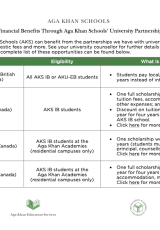Official Inauguration of AKA, Hyderabad
Education involves more than good marks, observed Alisha Sonawalla, a grade 12 student at the Aga Khan Academy, Hyderabad. “It is when you learn, you observe, you make mistakes and have space to experiment. That is what I saw in the philosophy and in the vision of the Aga Khan Academy,” she said. “That is what drove me to come here.”
Alisha is one of about 350 students who attend the new Academy in Hyderabad, India. The school is the second to open in the growing network of Aga Khan Academies. It took in its first students in August 2011 and is now running a full programme at both primary and secondary levels, including a residential programme for senior students.
Grade 10 student Aaliq Sitafalwala talked about the Academy as being very different from other schools that focus primarily on textbooks and exams. The Academy is a place that transforms, he said. “Over here you read, you understand, you learn, you grasp…It's phenomenal – it's a different school.”
The official inauguration of the Aga Khan Academy, Hyderabad took place on 20 September 2013. The Academy was inaugurated by the Chief Minister of the Government of Andhra Pradesh, the Honourable Sri N. Kiran Kumar Reddy, and India’s Minister for Human Resource Development, the Honourable Dr M.M. Pallam Raju, in the presence of His Highness the Aga Khan.The ceremony was held on the Academy’s purpose-built campus, which is situated on a 100-acre site donated by the Government of the State of Andhra Pradesh. The gifting of the site demonstrates the Government’s confidence in the Academy’s vision and its potential long-term impact, which the Chief Minister noted in his comments at the event.
“I think the Aga Khan Academy is another feather in the cap of Hyderabad and Andhra Pradesh,” he said. “This school will teach the children an overall development of their personality and make excellent citizens, not only for this city or state, but for the world.”
His Highness thanked the Government for its generosity in making the site available, noting that “Site selection and availability is critical to our whole concept of creating an international network of Academies in Asia and Africa.”
He spoke further about the network, saying, “The network concept that I have mentioned is something that makes our Academy endeavor a unique and distinctive one. And if there is one central thought I would like to have you take away from this day, it is the interconnected, international dimension of our envisioned Academy experience. Our planning is that there eventually will be 18 Academies, situated in 14 countries. I would not name them individually for you, other than to illustrate the amazing permutations of languages, cultures and personal experiences that such a network will offer its faculty, its staff, and its students.”The network is already taking shape. The first Academy opened in Mombasa, Kenya in 2003, the second in Hyderabad in 2011, and the third in Maputo, Mozambique in August 2013. Plans for additional Academies are at different stages, with active planning already underway in Tanzania, Kyrgyzstan and Bangladesh.
As the network grows, exchanges between Academies will allow students as well as faculty members to experience the world through different lenses and learn first-hand about the richness that diversity brings. At the Academy in Hyderabad, the diversity of the student body is already providing practical experience of pluralism.
“Pluralism is being lived in the residences through strong friendships amongst very diverse students,” noted Salim Bhatia, Director of the Aga Khan Academies, at the inauguration. “Those from Andhra Pradesh, Tamil Nadu, Maharashtra and Gujarat share a room – and their lives – with others from Uganda, the Democratic Republic of Congo, Mozambique, Myanmar, Dubai and the United States.”“Christians, Hindus and Muslims are close friends,” he continued, “having supported one another from their very first days on campus. Students from well-to-do families are friends with others who receive substantial scholarship support. On any given day, you can hear these students calling home in many languages and dialects.”
Over 50 percent of students receive full or partial bursaries, giving a wide range of students access to an Academy education. By intentionally bringing together a diverse group, the Academy fosters understanding and appreciation across different cultures and sectors of society. Students gain experience in working with and building consensus among people of different backgrounds – essential skills for future leaders who will help create strong, pluralistic societies.
Nidhitha Kothapalli, a senior student at the Academy, values the diversity of the student body, which has helped broaden her worldview. “We’ve come from completely different cultures and backgrounds,” she said. “It’s actually been a really good thing for me personally…It gives me different insight because it’s like a comparative right in front of me. It’s a really interesting experience.”The quality of the student experience is at the heart of the Academy. For example, students develop leadership skills by taking active leadership roles. They demonstrated this at the inauguration ceremony – senior students were the emcees, introducing the guests and keeping the ceremony on schedule, and other students ushered people to their seats. The Junior School choir performed, and the unveiling of the commemorative plaque was preceded by a student dance recital.
The vision of the Aga Khan Academies is to develop future leaders who will strengthen their societies, whether through government, civil society, academia, business or the arts. Alisha Sonawalla’s hopes for the impact she will make in the future reflect this vision. “Whatever it is I want to do,” said Alisha, “it would be to get the best education and give back to the society.”
publications




